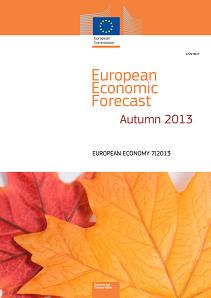Smaghi, L.B., (2013), “Austerity and Stupidity”, VoxEU, 06 Νοεμβρίου. Today’s austerity, many argue, is stupid. This column argues that today’s EZ austerity may arise from stupidity before the crisis – specifically lacklustre structural reform. Excess debt arose in nations maintaining unsustainable living standards and welfare systems in the face of poor growth. The Crisis forced radical adjustments such as austerity in a recession. It’s not austerity which caused low growth, …Read More
From Unemployment to Entrepreneurship
Mortensen, D., (2013), “From Unemployment to Entrepreneurship”, Project Syndicate, 07 Νοεμβρίου. It is well known that manufacturing employment has declined significantly in the United States, owing to the rise of manufacturing in developing countries like Mexico and China. But few recognize similar drops in other sectors, despite such trends’ far-reaching economic, social, and political implications. Since 1972, the number of telephone operators has fallen by 82%, typists by 80%, secretaries …Read More
Shadow banking and the global financial ecosystem
Pozsar, Z., (2013), “Shadow banking and the global financial ecosystem”, VoxEU, 07 Νοεμβρίου. Modern banks operate in a complex global financial ecosystem. This column argues that regulating banks properly requires updating our ideas about how they operate. Modern banks finance bond portfolios with uninsured money market instruments, and thus link cash portfolio managers and risk portfolio managers. Gone are the days when banks linked ultimate borrowers with ultimate savers …Read More
Why Wealth Taxes Are Not Enough
Rogoff, K., (2013), “Why Wealth Taxes Are Not Enough”, Project Syndicate, 04 Νοεμβρίου. Should advanced countries implement wealth taxes as a means of stabilizing and reducing public debt over the medium term? The normally conservative International Monetary Fund has given the idea surprisingly emphatic support. The IMF calculates that a one-time 10% wealth levy, if introduced quickly and unexpectedly, could return many European countries to pre-crisis public debt/GDP ratios. It …Read More
The European Banking Disunion
Gros, D., (2013), “The European Banking Disunion”, Project Syndicate, 06 Νοεμβρίου. The purpose of the euro was to create fully integrated financial markets; but, since the start of the global financial crisis in 2008, markets have been renationalizing. So the future of the eurozone depends crucially on whether that trend continues or Europe’s financial markets become fully integrated. But either outcome would be preferable to something in between – neither …Read More
Easing now or later? – That’s the ECB’s question
De Sousa, C., (2013), “Easing now or later? – That’s the ECB’s question”, Bruegel, 06 Νοεμβρίου. October euro area annual overall inflation is expected to be 0.7% (the lowest in 47 months and down for the fourth consecutive month), while core inflation (excluding energy, food, alcohol and tobacco) is estimated at 0.8%; down from 1.1% and 1.0% in September respectively, according to a flash estimate from Eurostat This is below …Read More
Sovereign Risk and Belief-Driven Fluctuations in the Euro Area
Corsetti, G., Kuester, K., Meier, A. and Müller, G., (2013), “Sovereign Risk and Belief-Driven Fluctuations in the Euro Area”, International Monetary Fund, IMF Working Paper, WP/13/227. Sovereign risk premia in several euro area countries have risen markedly since 2008, driving up credit spreads in the private sector as well. We propose a New Keynesian model of a two-region monetary union that accounts for this “sovereign risk channel.” The model is …Read More
The deflationary bias of Germany’s current account
Cohen-Setton, J., (2013), “Blogs review: The deflationary bias of Germany’s current account”, Bruegel, 06 Νοεμβρίου. For the first time the U.S. Treasury semi-annual report to “Congress on International Economic and Exchange Rate Policies” blamed Germany explicitly for its continuous current account surpluses, which have resulted into “a deflationary bias for the euro area, as well as for the world economy.” The response of the German finance ministry that Germany’s current …Read More
Europe’s Non-Rhetorical Values
Balcerowicz, L., (2013), “Europe’s Non-Rhetorical Values”, Project Syndicate, 05 Νοεμβρίου. The debate about Europe’s future is burdened by misleading and emotionally charged rhetoric, with vague talk of “more Europe” hampering productive discussion about European countries’ real problems. Indeed, beyond the loaded language lie fundamental questions that have yet to be answered convincingly. What exactly would “a federal Europe” entail? Is “European solidarity” a euphemism for the transfer union that Germany …Read More
European Economic Forecast – Autumn 2013
European Commission, (2013), European Economic Forecast – Autumn 2013, Brussels: European Commission. The EU economy has returned to positive GDP growth. Following a slow and still vulnerable expansion of economic activity during the remainder of 2013, growth is set to become gradually more domestic demand-driven and more robust in the course of 2014 and into 2015. The legacy of the crisis-deleveraging, financial fragmentation, elevated uncertainty and rebalancing needs – will …Read More





